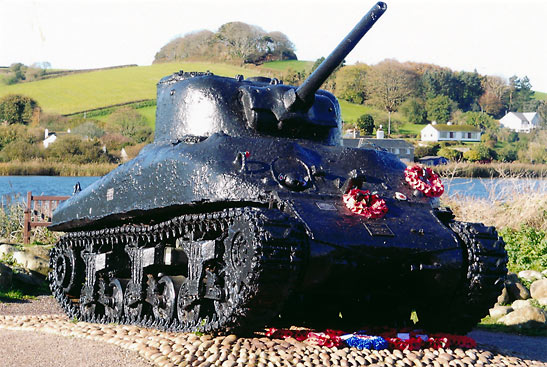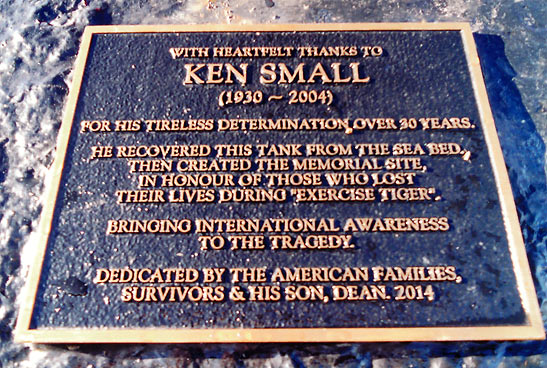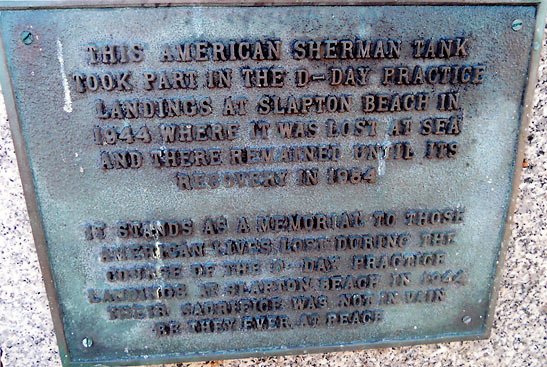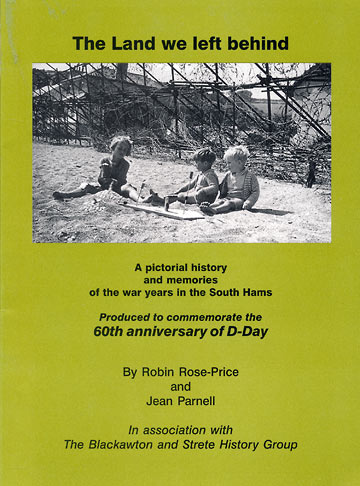|
A 1944 WW2 'Cover
Up' At England's Slapton Sands
By John Clayton Photos by Susan Ward
A good case in point is my Travel With A Difference article for this edition of Traveling Boy because it recounts a military disaster so terrible that it was meant to be a secret for all time. Whatever your original plans were, let me recommend you take a look at Devon – and a remarkable beach and village – called Slapton. Apart from what made it so infamous in WW2 for the British and American governments, the areas around this part of Great Britain, also include a delightful, even quaint (in a very British sort of way) camping and caravan area, for those who love this sort of a rural holiday. More on that, later in the story. What was it that happened in April, 1944, that caused the British and American governments' to NEVER want the truth to be known? The specifics were hidden from public view for an astonishing 31 years and, when the facts trickled out in 1975 – by accident – it was because a chunk of military hardware was found in the waters off Slapton Sands beach. Before you read any further, do YOU have any idea what it was? Growing up in London some of my happiest childhood memories are of holidays my family and I took in the scenic counties of Devon and Cornwell. Get out of London, and head westwards – and, as you see road signs with the word DARTMOUTH, find the A379 road that runs between Kingsbridge and Dartmouth, and you'll come across the seaside village of Slapton. With such a small population – in 2001 it was only 473 – the village might still be just one of the charming places sprinkling the picturesque countryside of Devon. But Slapton Sands has a unique feature that senior WW2 military officials realized was a superb place to carry out a test invasion, because the beach replicates – almost stone for stone – Utah beach in Normandy. The latter being one of the 5 beaches in France where the invasion would begin. With that, what came to be known as Operation Tiger, was set in motion. In the late 1960s a Brit called Ken Small, opened a B&B in a Devon village called Torcross. It's located at the southern end of Slapton Sands, a narrow strip of land and shingle beach which separates the freshwater lake of Slapton Ley from Start Bay and carries the A379 coastal road north to Dartmouth. For exercise, Ken walked on Slapton's beach. As he trudged along the pebbly seashore one day, he was surprised to find an assortment of bullet cases, bits of shrapnel and coins, from the WW2 era. Thus began Ken's search to find out how and why they happened to be there. His quests for answers lead him to a local fisherman who said his nets often got tangled up in something on the seafloor. Ken hitched a ride on the seafarer's next trip and, suited up in diving gear, Ken jumped overboard. What he spotted on the seabed stunned him. An American WW2 Sherman tank! The tank that Ken Small discovered resulted in an enormous amount of media coverage – as could be expected – and it was the beginning of ample worldwide publicity about the heart-rending event that had taken place in April, 1944.
It turned out that the tank was but a small part of a military exercise gone dreadfully wrong. But it was highly significant, because it was the vehicle (in every sense of that word) for what followed. On the night of April 28th, 1944, a fleet of American LSTs (Landing Ship Tanks) that not only had tanks onboard, but were also full of GI's who were set to invade "Fortress Europe" in just over a month. Now they were embarked on what they thought would be an exercise on what to expect in Normandy. Instead, it became an Allied disaster so substantial, it was meant to be "Off the Record" forever. Due to miss communication between British and American warships; plus the fact that radio frequencies of the British and Americans were NOT on the same wavelength; then too, live ammunition was used – the consequence of all this confusion, was a series of collisions and, even more horrifying, deaths from live fire that hit numerous ships, LSTs and other vessels in Exercise Tiger. To make matters even more horrific, a large flotilla of German E-Boats (like the allied motor torpedo boats or MTB's) suddenly – and completely unexpectedly – materialized, that sank or damaged many more of the LSTs. The tragic result was that more allied soldiers and sailors were killed in Exercise Tiger – over 700 – than the 200 on Utah Beach in the invasion on June 6th, 1944.
The US and British governments were so traumatized by this disaster they kept it secret until Ken Small discovered that tank. In 1984, with the help of local residents, and diving firms, he got it to the surface, and it now stands as stark memorial to that awful catastrophe in 1944. The truth of this calamity, really hit the newsstands on May 3rd, 1984, when ABC TV aired a special called The Tragic Secret of Slapton Sands, and the shocking story became worldwide news. If combing history with a superb vacation – in two of the most scenic locations in "Jolly Old England" – are your cup of tea, Google the British counties of Devon and Cornwall, and you'll see why they should be included on your trip. If you want to spend more than a day or two in Torcross and Slapton Sands, and explore the nearby historic town of Dartmouth, consider two options. One is to make this a camping holiday by taking along the family tent for you and the kids, and the 2nd idea is to rent what the Brits call a Caravan, and we call an RV or Motor Home. While there are additional "Campsites" in this area, the one I discovered that's totally intriguing, is the Sea View Campsite. As Brits are supposed to be reserved and NOT romantic, I loved the Sea View website description (note British spelling!) of their property, as it dispels that notion instantly – how's this for romantic? – "A peaceful, uncommercialised farm site with grass underfoot and stars overhead, surrounded by the beautiful Devon countryside, and with breathtaking views across the fields to the sea. This family-run site makes a perfect holiday base, being close to Dartmouth and many lovely beaches including the award-winning Blackpool Sands. (For more information see our 'Local Interest' page). The site prides itself on giving each camper a roomy, level pitch, with even more space for ball games etc. The site consists of two level fields totalling 10 acres. There is plenty of room to pitch your tent and space for the children to play." If you go to Slapton and get connected to the WW2 history I've hopefully intrigued you with in my feature, I'd love to hear from you. Devon and Cornwall are, in my view, some of THE most mesmerizing and exquisite areas of England. As such, let me know your thoughts about that too. My email is jdcradio@gmail.com.
Related Articles: |

 hen
you think about your next vacation, do you ever consider staying in
a place that is, for one reason or another, famous in world history?
On the other side of the coin, what if you had no idea that your destination
was the scene of a series of appalling "military mix-ups,"
would that make you more – or less interested? As an example, Slapton
Sands, in the western part of England, in the county of Devon. What
made it eventually well-known was an "Event" that took place
just weeks before the Allies – in the biggest invasion in world
history – invaded
hen
you think about your next vacation, do you ever consider staying in
a place that is, for one reason or another, famous in world history?
On the other side of the coin, what if you had no idea that your destination
was the scene of a series of appalling "military mix-ups,"
would that make you more – or less interested? As an example, Slapton
Sands, in the western part of England, in the county of Devon. What
made it eventually well-known was an "Event" that took place
just weeks before the Allies – in the biggest invasion in world
history – invaded 

